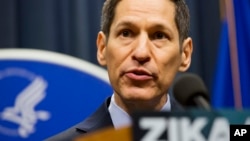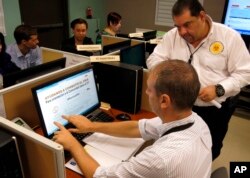Senior White House officials say the Obama administration will redirect nearly $600 million in funds, the majority from existing Ebola resources, to fight the spread of the Zika virus.
“These repurposed funds are not enough to support a comprehensive Zika response and can only temporarily address what is needed until the Congress acts on the administration’s emergency supplemental request,” Office of Management and Budget Director Shaun Donovan said Wednesday.
The White House submitted that $1.9 billion request to Congress in February of this year.
Funding shortfall
On Wednesday, White House officials warned that without the funding, the U.S. risks not having the ability to properly respond to the Zika virus, including delays in mosquito control and surveillance, diagnostic testing, and vaccine development.
“These efforts need to continue, and they can’t be stopped or short-changed. We face two real global health challenges, Ebola and Zika. And we don’t have the option to set one aside in the name of another,” Department of Health and Human Services Secretary Sylvia Burwell told reporters.
Burwell says there are now 672 confirmed cases of Zika in the United States, including 64 pregnant women. One Zika-related case of microcephaly confirmed in the state of Hawaii.
Officials say local transmission is currently centered in Puerto Rico, the U.S. Virgin Islands and American Samoa. But they believe there will likely be local transmission in the continental United States in the coming months.
40 million travelers affected
About 40 million people traveling between the continental U.S. and Zika-affected countries. The administration says as of last week, 33 countries and territories in the Americas reported active Zika transmission.
“The international outbreak of the Zika virus is sustained, severe and spreading internationally, and... it is in the U.S. national interest to respond to this public health emergency,” Deputy Secretary of State Heather Higginbottom outlined the message to Congress in redirecting funds from Ebola to the Zika response.
The administration’s efforts are focused on Puerto Rico, with 31 personnel from the Center for Disease Control on the ground and a Dengue field office converted to handle the Zika response – including mosquito control and surveillance and the education of pregnant women.
Health and Human Services Secretary Burwell said the U.S. is working to increase the supply of diagnostic tests and public health laboratories and accelerate vaccine research, noting five to six vaccine candidates are lined up to start phase 1 trials in September.
But White House officials say progress in the Zika diagnosis and prevention will be stymied without Congress’ immediate action on emergency funding.
“We cannot wait. There are activities that we cannot start now, there are activities in the coming months that we may need to stop doing. And particularly given the uncertainty and the risks, we should not play with fire here,” Director Donovan said.
The administration says it has identified $589 million – including $510 million of existing Ebola resources within the Department of Health and Human Services and Department of State/USAID – that can quickly be redirected and spent on immediate, time-critical activities.
Officials are also urging Congress to replenish the redirected funds from the Ebola response, warning the virus remains a threat to global health with recent cases in Guinea and Liberia.
“These continued outbreaks demonstrate exactly why it is critical to continue to be vigilant in West Africa,” Deputy Secretary of State Higginbottom noted. “We need to continue to support West African nations as they recover from Ebola and ensure we avoid further widespread outbreaks of Ebola.”





